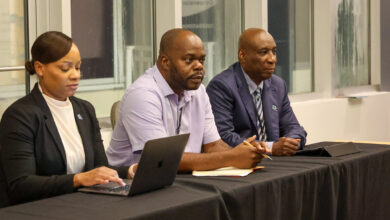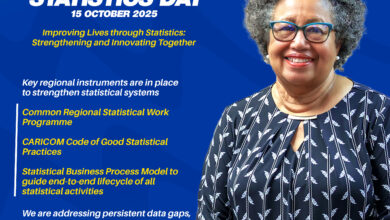Salutations
It is my pleasure to bring you greetings on behalf of the Secretary-General and to welcome you to the Eleventh Meeting of the Council for Human and Social Development. This meeting of COHSOD is the culmination of a series of consultations on accreditation and technical and vocational education, the recommendations from which form part of your impressive agenda.
The theme of this COHSOD, Investing in Human Resources with special Reference to Education and Training, is most appropriate at this juncture in the history of the regional integration process. As you all know, accelerating the implementation of the CARICOM Single Market and Single Economy is the flagship activity of the CARICOM Secretariat and indeed the Caribbean Community as a whole. At least four countries have pledged to be CSME ready at the beginning of 2005 and many others by the end of next year. What this means is that much energy is being exercised to ensure that systematic regulations for trade in goods, services and financial arrangements are put in place, as well as the establishment of a fully functioning Caribbean Court of Justice by the first quarter of 2005.
The small states that make up the Caribbean Community are confronted with several critical challenges. Among them are the rigid WTO conditionalities for competitiveness in the global market place which include the dismantling of preferential treatment with dire consequences for the erosion of our agricultural and manufacturing sectors. In addition, there are relatively high unemployment rates, high levels of poverty and a high incidence of HIV/AIDS, especially among the youth ages 15-35 years – our most productive resources.
Added to this is the vulnerability of Caribbean states to natural disasters. The most telling effect has been demonstrated in Grenada and Haiti after Hurricane Ivan, and to a lesser extent in The Bahamas, the Cayman Islands, Jamaica and St. Vincent and the Grenadines. I take this opportunity to express our solidarity and support to the participants from our sister countries for their traumatic experiences. Such experiences are increasingly becoming part of the hazards of our economies that are not easily measured in terms of human suffering and social dislocation. The CARICOM Secretariat is mandated by Heads of Government to collaborate with the Government of Grenada as it seeks to recover as quickly as possible from this devastation with the assistance of the several donor partners, some of whom are represented today at this meeting.
Such wide-ranging social challenges that include disaster preparedness and management are the focus of attention for COHSOD and the Directorate of Human and Social Development. It is very instructive – as the Assistant Secretary-General of the Directorate pointed out in his introductory remarks – that the strategy approved by COHSOD is an intersectoral one. I am therefore pleased to note that while your deliberations focus on education and training, the agenda is sensitive to the interconnections between education, labour and health, youth and sport, Information and Communication Technologies for Development, culture and gender issues and crime and security.
Indeed, our labour market situation, so relevant to the issues of education and training, and triggered by the current international configuration and the CSME, is becoming increasingly more complex for policy-makers. This is due to the fact that among other issues, Caribbean markets need to adjust to new skill demands and to high levels of migration of skilled workers. In this regard, the high rates of migration of our teachers and nurses are a cause for concern. I am, however, happy to note that this meeting will address these issues. But the new skills that really provide our educators and policy-makers with a challenge include those for high-end, value added jobs, requiring frontier skills, good technical skills, being information technology aware, flexible and problem solvers with good work ethic and attitudes. What this means is that the reconfiguration of a relevant education programme must take into account the pressing characteristics of a knowledge-based economy and produce a new type of worker capable of competing in a new work environment that is international in scope and impact.
I expect that your discussions will zero in on certain critical questions such as: “Is our education system responsive to these new demands and, if not, what is required?”
In the first instance, the answers related to the production of high-end skills will depend on the capability and willingness of our tertiary level educational institutions to be innovative. In this regard, the CARICOM Secretariat has joined the OECS Secretariat and the World Bank in spearheading the development of the Caribbean Learning and Knowledge Network (CLKN) based on ICT interconnectivity. Here, the implications for collaboration in training and research among tertiary level institutions are enormous as it is predicated on the assumption of advancing learning in a knowledge-based industrial and globalised world.
I should add here that the CKLN initiative is only one component of the ICT for Development Agenda that the Region has embarked on. Additionally, we need to continuously commit to human resource development, starting with curriculum development and reform at ALL levels in order to equip the people of the Region with the skills necessary to live well and compete in the new global Information Society.
The second phase of the World Summit on the Information is now just twelve months away and it is therefore imperative that the Region mobilise its resources to ensure that our participation in the WSIS activities culminate in meaningful participatory projects and programmes where the full benefits of the use of ICTs as a tool are exploited.
It is important that this meeting acknowledge the critical importance of ICTs as a tool for the development of the people of the Region.
Secondly, as has been acknowledged by Member States, there is greater need for higher enrolments in tertiary-level education. The present level, in the vicinity of 8-10 percent, although much improved from a decade ago, is still too low compared with other developing countries — in particular in Latin America with 15 percent – not to mention that of developed countries. Competition in the global economy requires many more qualified citizens capable of creating jobs from the knowledge spaces that emerge.
Thirdly, emphasis has to be placed on increasing the language competencies of our school-leaving populations. The CARICOM Secretariat continues to coordinate a series of scholarships and language training schemes between students and teachers. In this respect, the Governments of Cuba and Mexico have been among our most committed benefactors and I take this opportunity to express our sincere gratitude to them. But a greater effort is still required in bringing languages to our people. Hopefully this issue will receive some emphasis during your deliberations.
Fourthly, there is the issue of accreditation and standardisation. If the CSME is to be meaningful, regional and national accreditation bodies must be institutionalised. I am pleased to have been present in July this year in Jamaica at the launching of the Caribbean Accreditation Authority for Education in Medicine and other Health Professions and wish to acknowledge the presence here today of the newly appointed Director of the Authority, Ms Lorna Parkins. Hopefully, this initiative of our medical and health professionals will stimulate others into action, since common mechanisms of accreditation and standardisation are critical to the facilitation of free movement of skills in the CSME.
I am pleased that at this opening ceremony you will take the time to acknowledge the contributions of two CARICOM staff members who over the years have played vital roles in the programmes related to education and training. I refer to Dr. Carole Maison-Bishop and Mr Holison Gift. They have both taken their leave of the Secretariat and we will be the worse for it. Dr. Maison-Bishop will be leaving after 25 years of distinguished service – her last substantive position being that of Programme Manager, Human Resource Development which embraces education and training programmes in the Region. She is well known to the fraternity of policy-makers, officials and institutions present at this meeting. Dr. Maison-Bishop has also been associated with the coordination of CARIFESTA VII in Suriname in 2003 and with piloting the work of the Task Force on reconfiguring that Festival. I invite you to join me in recognsing her valuable role and contribution on behalf of education and culture in the Region.
Mr. Gift has been attached to the Directorate of Human and Social Development for a shorter period of nine years but has also made a vital contribution in the areas of accreditation and language training. His last assignment a few weeks ago was in Grenada to make an assessment of the requirements of the education sector there in response to the needs of the Grenadian students. I invite you to show your appreciation for Mr. Gift’s contribution to this Directorate and to the work of COHSOD.
COHSOD has a critical role to play in the CSME. As you deliberate today and tomorrow, you will no doubt be concerned with those factors that have placed the area of functional cooperation among the pioneers of regional integration – among them the collaboration in health systems reform in the 1970s and 1980s which led to the Caribbean Cooperation in Health Initiative, as well as the role of the education programme that resulted in CXC being an outstanding example of what can be achieved by regional collaboration. I am confident that these models will be emulated as you try to chart the course forward, since the Region more than ever needs initiatives that work and that place our people at the centre of development.





